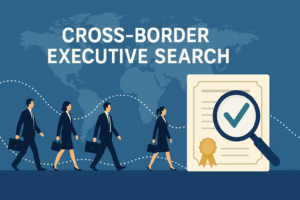
Executive search firms are increasingly tasked with placing leaders across borders. Global talent mobility creates opportunities for diversity, innovation, and growth, but it also brings new risks—especially when it comes to education and credentials.
The reality is clear: nearly half of executives fail in their roles within the first 18 months. For cross-border placements, these failures are often tied to gaps in education alignment, credential authenticity, and recognition across different systems.
Education Gaps by Region
Educational systems vary significantly across regions, and without proper evaluation, recruiters and clients risk misunderstanding the true value of a degree or qualification.
| Region | Common Shortcomings in Education Recognition | Impact on Executive Hiring |
| North America | Limited understanding of non-U.S. degrees; inconsistent recognition of vocational vs. academic qualifications | Misinterpretation of international credentials slows hiring and creates uncertainty for clients. |
| Europe | Fragmented national frameworks, despite the Bologna Process; uneven recognition of non-EU qualifications | Candidates from outside the EU may face skepticism without formal evaluations. |
| Asia | The rapidly expanding higher education sector has uneven quality assurance | Difficulty distinguishing top-tier institutions from diploma mills; risks of credential fraud. |
Sector-Specific Credential Challenges
Some industries are especially vulnerable when education and licensing requirements differ across borders.
| Industry Sector | Education & Credential Shortcomings | Risk in Cross-Border Hiring |
| Healthcare | Licensing boards often require a detailed evaluation of foreign medical degrees. | Misaligned or unverified credentials can bar candidates from practice, delaying placements. |
| Hospitality/Leisure | Executive programs vary widely by country; management credentials lack standardization. | Candidates may appear “qualified” on paper but lack equivalent training or accreditation. |
| Technology | Skills are often acquired outside traditional degree pathways; informal certifications are not universally recognized. | Difficulty proving equivalence leads to missed opportunities for qualified global candidates. |
| Consumer/Retail | Business degrees differ widely in content and rigor; MBA programs are not uniform globally | Misalignment creates challenges in leadership credibility and client trust. |
| Financial Services | Strict regulatory exams and licenses are not portable across countries | Without credential evaluation, global hires risk non-compliance. |
Why Credential Evaluation is the Answer
Credential evaluation addresses these shortcomings by:
- Authenticating Documents – Protecting Against Fraud and Diploma Mills.
- Standardizing equivalency – Translating global education achievements into familiar frameworks.
- Supporting compliance – Ensuring credentials meet regulatory requirements in regulated industries.
- Clarifying quality – Distinguishing between rigorous programs and unaccredited qualifications.
The Cost of Overlooking Education
When educational shortcomings aren’t addressed, executive searches fail. The costs are immense: prolonged vacancies, failed placements, loss of client trust, and financial losses that can reach into the millions.
Partner with ACEI
For over 30 years, the Academic Credentials Evaluation Institute (ACEI) has helped employers, universities, and professional boards understand international education. Our evaluations empower executive search firms to:
- Place global candidates with confidence.
- Reduce risk and protect client reputation.
- Accelerate hiring timelines by removing credential uncertainty.
If your firm is navigating cross-border executive search, ACEI can be your trusted partner in credential evaluation.
📩 Contact us at [email protected] or visit https://acei-global.org/ to learn how we can support your next global placement.
